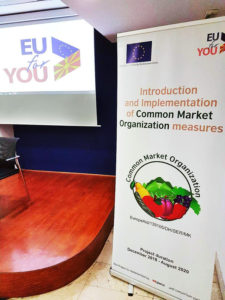
Strengthening the Internal Market
Project is comprised of six components, as follows: Component 1: Improving the strategic, legislative and institutional framework in area of Free Movement of Goods Component 2: Improving the strategic, legislative and institutional framework in area of Free Movement of Services. Component 3: Improving the legislative alignment with the

Increasing Attractiveness, Inclusiveness and Relevance of VET and Adult Education
The overall objective is to improve skill matches of youth and adults in line with labour market needs by increasing access to quality vocational education, training and adult education. The project supports the Ministry of Education and Science of the Republic of Nort Macedonia and related national educational

Improvement of Legislation, Control and Awareness in Food Safety, Animal Health and Welfare in Ukraine
The project aims to support the implementation of the Association Agreement’s provisions between the EU and Ukraine concerning food safety, animal health, and welfare.

Implementation of Common Market Organisations (CMO) in the Former Yugoslav Republic of Macedonia
The project’s overall objective is to increase marketing opportunities, economic development and overall productivity in the agricultural sector of North Macedonia while improving competitiveness of the agriculture sector in the country in line with EU accession requirements.

Technical Assistance to Support the Implementation of the Rural Development Sector Development Programme (Phase 1 + 2)
After the positive vote of the Turkish Cypriot community in the 2004 referendum to reunite the island, the European Council decided to end the isolation of the Turkish Cypriot Community and facilitate its integration with the EU. Therefore, the purpose of the project was to improve socio-economic conditions

Enhancing the Employability of Youth and Unemployed/Low-Skilled Workers, and Improving Their Transition to Employment In Egypt
It can be claimed that advancing the structure and performance of the TVET (Technical and Vocational Education and Training) system and TVET deliveries is essential to better respond to new socio-economic needs, in particular, youth employability and increased competitiveness in the context of the country’s current and future

